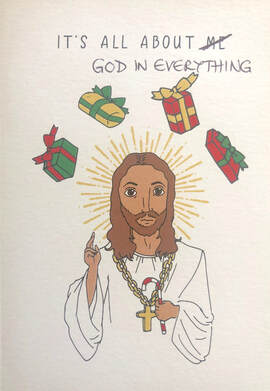
All About God in Everything – that’s powerfully expressed in the Gospel stories of the birth of Christ. For the Gospel stories do, of course, direct us to the child Jesus. But they do so by pointing us to many other legendary features of the birth: such as the angels, shepherds, and magi. These are indeed there in the story to honour the child Jesus, but they also convey to us the presence of God in all levels and elements of our lives and world. For the message of the Gospel as whole is not God, in Jesus, saying ‘It’s All About Me’. It is God, in Jesus, saying Its All About All of Us and All About Everything.
Let’s look briefly at three of the features of the birth stories which point us to this truth…
Firstly, there is Mary and her body. For, whatever you believe, or don’t believe, about the biological specifics of Jesus’ conception, the birth of God in Jesus is quite astonishing, spiritually speaking. It simply shatters ancient ideas of the body, and matter itself. Brilliant as they were, the great Greek philosophers, and many other ancient traditions, believed that God, and holiness, was essentially separate from material reality, and not least the messiness of human bodies. God is also typically powerful, invulnerable, and unaffected by the chances and changes of earthly life. Yet, in the story of Jesus, we have such a different picture! Indeed, it so revolutionary, that even today we often have difficulty coming to terms with it.
Jesus’ birth proclaims that God, ultimate meaning and holiness, is to be found everywhere, in the messiness of material existence, and not least in the messiness of human bodies – all human bodies. That’s the point about Mary. In ancient times, and still sadly today sometimes, women’s bodies didn’t seem to matter so much. They were even regarded as somewhat ‘indecent’. This is clear in Mary’s story, where she is also someone who has conceived out of marriage, and is probably a person of uncertain heritage to boot. So Jesus being born in Mary is a declaration that God not only loves ‘indecent’ bodies. God is actually born in ‘indecent’ bodies. What a blessed gift that is – isn’t it? – to any of us, all of us, who have ever been worried about our own body! God is born in us, just as we are. We too, like Mary, can be bearers of grace, holiness and love. Its All About Us too.
Secondly, there’s the angels. Now, we’ve typically lost the significance of angels in recent times. They’ve either become somewhat sentimentalised, like cute fairies at the bottom of the garden, or they don’t seem to make a great deal of sense to many of us. Yet they are really important in the Gospel story, as, again, they turn ancient, and much later mystical, thinking upside down. For, in ancient times, angels were part of sophisticated ways of thinking about the cosmos, the whole of creation, seen and unseen, and the beginning and end of everything. In such explorations, the angels were vital links in binding everything together, including all the levels of all types of existence. For this is big picture thinking, like that engaged in today by amazing scientists and cosmologists, who seek to explore the length, depth and breadth of everything that is.
The angels are therefore powerful witnesses to God’s presence in everything. Today we may want to look at this scientifically too. Yet they proclaim that all of existence is linked together, from the tiny child to the most distant star, from ‘the big bang’ to whatever will be, from the smallest part of life to the possibilities of multiverses beyond end. God, the angels, and the birth of Jesus, affirm, is everywhere. For Love is the heart of the cosmos, however we view it and however it unfolds. It’s All About Everything too.
Thirdly, and vitally for our common futures, there’s the manger itself. This partly represents what we see in Mary – namely the astonishing revelation of God born in hitherto surprising, even ‘indecent’, places It also reminds us that God, like the rest of us, shares not just in human but in animal existence. We, like God, are not ‘above’ the rest of the animals to whom we belong. We, like God, are one with them. However, I believe there is more, perhaps disturbingly more. For what if the manger, full of all kinds of insects and microbes, is also a place of potential, and actual, virus and disease? What then?...
What do you think? Where is God in the great virus of our day? The first Christmas story is not about Jesus alone, nor just about the human, the angelic and the wider animals involved too. The birth of Jesus proclaims that God is born in the midst of all of life, hostile as well as warm and welcoming. If we struggle with Christmas in Covid-19 times, then we do so in company with God, the power of love and redemption, right there in the challenges of the manger. Covid-19 may have profoundly humbled our human plans and pretensions, but there is hope beyond where we learn to begin again in love. For I’ve been drawn this week to words of Dietrich Bonhoeffer, the great German theologian, martyred by the Nazis: Who will celebrate Christmas correctly?, Bonhoeffer wrote. His answer? Whoever finally lays down all power, all honour, all reputation, all vanity, all arrogance, all individualism, beside the manger’
I don’t know about you, but if the Christmas Gospels are proclaiming a God in indecent bodies, in every aspect of the cosmos, and even in our biological struggles, then we are always in the midst of genuine hope. God, as the Christmas angels declare, is in everything. Out of darkness there is light, and the promise of new life – beyond human pretensions, ego, power, and virus. It's not All About Me, It's All About God in Everything. Let us lay down everything else beside the manger.
In the name of Christ, born among us, in all and through all, from all ages and for all ages to come. Amen.
by Josephine Inkpin, for Christmas Day 2020 @MiltonAnglicans

 RSS Feed
RSS Feed